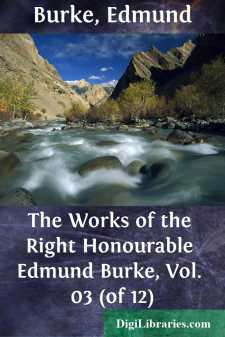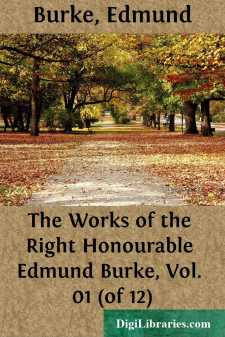Political Science
Political Science Books
Sort by:
by:
Edmund Burke
LETTER TO HIS GRACE THE DUKE OF PORTLAND. My dear Lord,—The paper which I take the liberty of sending to your Grace was, for the greater part, written during the last session. A few days after the prorogation some few observations were added. I was, however, resolved to let it lie by me for a considerable time, that, on viewing the matter at a proper distance, and when the sharpness of recent...
more...
by:
Edmund Burke
PREFACE. The following speech has been much the subject of conversation, and the desire of having it printed was last summer very general. The means of gratifying the public curiosity were obligingly furnished from the notes of some gentlemen, members of the last Parliament. This piece has been for some months ready for the press. But a delicacy, possibly over-scrupulous, has delayed the publication to...
more...
by:
Edmund Burke
SPEECH. The times we live in, Mr. Speaker, have been distinguished by extraordinary events. Habituated, however, as we are, to uncommon combinations of men and of affairs, I believe nobody recollects anything more surprising than the spectacle of this day. The right honorable gentleman whose conduct is now in question formerly stood forth in this House, the prosecutor of the worthy baronet who spoke...
more...
by:
Edmund Burke
A LETTER TO LORD ****. Shall I venture to say, my lord, that in our late conversation, you were inclined to the party which you adopted rather by the feelings of your good nature, than by the conviction of your judgment? We laid open the foundations of society; and you feared that the curiosity of this search might endanger the ruin of the whole fabric. You would readily have allowed my principle, but...
more...
by:
Edmund Burke
A LETTER TO A MEMBER OF THE NATIONAL ASSEMBLY, IN ANSWER TO SOME OBJECTIONS TO HIS BOOK ON FRENCH AFFAIRS. 1791. Sir,—I had the honor to receive your letter of the 17th of November last, in which, with some exceptions, you are pleased to consider favorably the letter I have written on the affairs of France. I shall ever accept any mark of approbation attended with instruction with more pleasure than...
more...
by:
Edmund Burke
VII.—CONTRACTS. That the Court of Directors of the East India Company had laid down the following fundamental rules for the conduct of such of the Company's business in Bengal as could be performed by contract, and had repeatedly and strictly ordered the Governor and Council of Port William to observe those rules, viz.: That all contracts should be publicly advertised, and the most reasonable...
more...
by:
Edmund Burke
NINTH REPORT From the SELECT COMMITTEE [of the House of Commons] appointed to take into consideration the state of the administration of justice in the provinces of Bengal, Bahar, and Orissa, and to report the same, as it shall appear to them, to the House, with their observations thereupon; and who were instructed to consider how the British possessions in the East Indies may be held and governed with...
more...
by:
Edmund Burke
SPEECH ON THE ACTS OF UNIFORMITY FEBRUARY 6, 1772. The following Speech was occasioned by a petition to the House of Commons from certain clergymen of the Church of England, and certain of the two professions of Civil Law and Physic, and others, praying to be relieved from subscription to the Thirty-Nine Articles, as required by the Acts of Uniformity. The persona associated for this purpose were...
more...
by:
Edmund Burke
FOURTH LETTER ON THE PROPOSALS FOR PEACE WITH THE REGICIDE DIRECTORY OF FRANCE. ADDRESSED TO THE EARL FITZWILLIAM. 1795-7. Letter from the Right Honorable the Lord Auckland to the Lord Bishop of Rochester. EDEN FARM, KENT, July 18th, 1812. My dear Lord,—Mr. Burke's fourth letter to Lord Fitzwilliam is personally interesting to me: I have perused it with a respectful attention. When I...
more...
by:
Edmund Burke
SPEECH IN GENERAL REPLY. FIFTH DAY: SATURDAY, JUNE 7, 1794. My Lords,—We will now resume the consideration of the remaining part of our charge, and of the prisoner's attempts to defend himself against it. Mr. Hastings, well knowing (what your Lordships must also by this time be perfectly satisfied was the case) that this unfortunate Nabob had no will of his own, draws down his poor victim to...
more...











